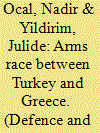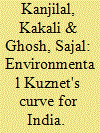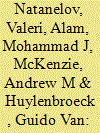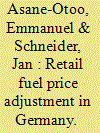| Srl | Item |
| 1 |
ID:
087001


|
|
|
|
|
| Publication |
2009.
|
| Summary/Abstract |
The ongoing Turkish-Greek antagonism has triggered the interest of defense economists to investigate the various aspects of the arms race between Turkey and Greece. However, empirical studies examining the long-run relationship between the military expenditures of the two countries offer little evidence in favor of such an interaction. This paper attributes the poor results of the previous literature to the adherence to linear cointegration techniques and argues that if the adjustment towards long-run equilibrium is asymmetric, nonlinear co-integration models should be employed. Accordingly, this paper considers threshold autoregressive (TAR) and momentum threshold autoregressive (M-TAR) models as alternative adjustment processes for the cointegration relationship, following Enders and Siklos (2001). The results indicate that the relationship between the variables can be characterized by a threshold cointegration specification following an M-TAR type adjustment process.
|
|
|
|
|
|
|
|
|
|
|
|
|
|
|
|
| 2 |
ID:
121306


|
|
|
|
|
| Publication |
2013.
|
| Summary/Abstract |
This study revisits the cointegrating relationship between carbon emission, energy use, economic activity and trade openness for India using threshold cointegration tests with a view to testing the environmental Kuznet's curve hypothesis in the presence of possible regime shift in long run relationship of the variables for the period 1971 to 2008. The article confirms the existence of 'regime-shift' or 'threshold' cointegration among the variables and environmental Kuznet's curve for India. It challenges previous empirical works for India which fail to establish cointegrating relationship among these variables and explains its logical and econometric reasons. The study finds that the carbon emission is highly elastic with respect to real per capita income and energy use in India. This finding is critical and warns successful design and execution of energy and environmental policy framework which would pave the low carbon sustainable growth path inIndia.
|
|
|
|
|
|
|
|
|
|
|
|
|
|
|
|
| 3 |
ID:
109350


|
|
|
|
|
| Publication |
2011.
|
| Summary/Abstract |
Even though significant attempts have appeared in literature, the current perception of co-movement of commodity prices appear inadequate and static. In particular we focus on price movements between crude oil futures and a series of agricultural commodities and gold futures. A comparative framework is applied to identify changes in relationships through time and various cointegration methodologies and causality tests are employed. Our results indicate that co-movement is a dynamic concept and that some economic and policy development may change the relationship between commodities. Furthermore we show that biofuel policy buffers the co-movement of crude oil and corn futures until the crude oil prices surpass a certain threshold.
|
|
|
|
|
|
|
|
|
|
|
|
|
|
|
|
| 4 |
ID:
137724


|
|
|
|
|
| Summary/Abstract |
Consumers in Germany often complain that retail fuel prices usually adjust quickly to crude oil price increases than decreases and characterize this pricing pattern as market power exploitation. In this paper, we use both weekly national and daily city-specific (Berlin, Hamburg, Munich and Cologne) data to investigate the extent to which retail fuel prices in Germany adjust to changes in the international crude oil price. At the national level with weekly prices, we find positive asymmetries for both gasoline and diesel within the period 2003–2007, reflecting that retail prices react more swiftly to crude oil price increases than decreases. In contrast, for 2009–2013, we observe symmetric adjustment and negative asymmetry for retail diesel and gasoline prices, respectively. The city level analysis supports our findings in the latter time period. Thus, regulatory measures aimed at the retail fuel market over recent years seem to have been effective, and, contrary to consumers' perception, we find no evidence for excessive market power or collusion.
|
|
|
|
|
|
|
|
|
|
|
|
|
|
|
|